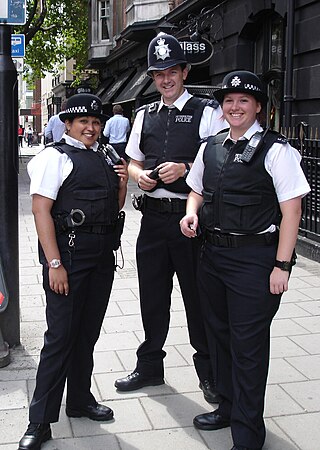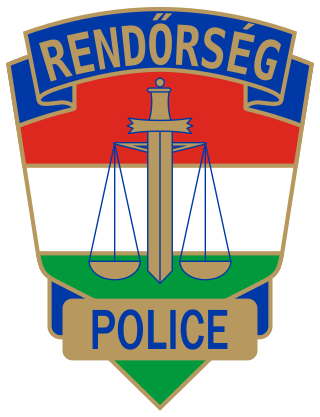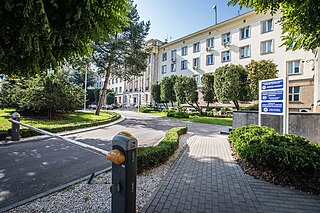Related Research Articles

Counterterrorism, also known as anti-terrorism, relates to the practices, military tactics, techniques, and strategies that governments, law enforcement, businesses, and intelligence agencies use to combat or eliminate terrorism and violent extremism.

Law enforcement in the United Kingdom is organised separately in each of the legal systems of the United Kingdom: England and Wales, Scotland, and Northern Ireland. Most law enforcement duties are carried out by those who hold the office of police constable of a territorial police force.
The Serious Organised Crime Agency (SOCA) was a non-departmental public body of the Government of the United Kingdom which existed from 1 April 2006 until 7 October 2013. SOCA was a national law enforcement agency with Home Office sponsorship, established as a body corporate under Section 1 of the Serious Organised Crime and Police Act 2005. It operated within the United Kingdom and collaborated with many foreign law enforcement and intelligence agencies.

Law enforcement in India is imperative to keep justice and order in the nation. Indian law is enforced by a number of agencies. India has a multi-layered law enforcement structure with both federal and state/union territory level agencies, including specialized ones with specific jurisdictions. Unlike many federal nations, the constitution of India delegates the maintenance of law and order primarily to the states and territories.

Law enforcement in Australia is one of the three major components of the country's justice system, along with courts and corrections. Law enforcement officers are employed by all three levels of government – federal, state/territory, and local.
The Australian Intelligence Community (AIC) and the National Intelligence Community (NIC) or National Security Community of the Australian Government are the collectives of statutory intelligence agencies, policy departments, and other government agencies concerned with protecting and advancing the national security and national interests of the Commonwealth of Australia. The intelligence and security agencies of the Australian Government have evolved since the Second World War and the Cold War and saw transformation and expansion during the Global War on Terrorism with military deployments in Afghanistan, Iraq and against ISIS in Syria. Key international and national security issues for the Australian Intelligence Community include terrorism and violent extremism, cybersecurity, transnational crime, the rise of China, and Pacific regional security.

The Federal Criminal Police Office of Germany is the federal investigative police agency of Germany, directly subordinated to the Federal Ministry of the Interior. It is headquartered in Wiesbaden, Hesse, and maintains major branch offices in Berlin and Meckenheim near Bonn. It has been headed by Holger Münch since December 2014.

Law enforcement in Hungary is split among the Police and Border Guards, and the Customs and Excise Authority. Since 2006, the Police has been subject to the Ministry of Justice, when the Ministry of Interior was re-structured to deal with Municipalities and Regional Development. Due to Hungary's accession to the Schengen Treaty, the Police and Border Guards were merged into a single national corps, with the Border Guards becoming Police Officers. This merger took place in January 2008. The Customs and Excise Authority remained to be subject to the Ministry of Finance.
The counter-terrorism page primarily deals with special police or military organizations that carry out arrest or direct combat with terrorists. This page deals with the other aspects of counter-terrorism:

In many countries, particularly those with a federal system of government, there may be several law enforcement agencies, police or police-like organizations, each serving different levels of government and enforcing different subsets of the applicable law.

Law enforcement in Poland consists of the Police (Policja), City Guards, and several smaller specialised agencies. The Prokuratura Krajowa and an independent judiciary also play an important role in the maintenance of law and order.

The National Crime Agency (NCA) is a national law enforcement agency in the United Kingdom. It is the UK's lead agency against organised crime; human, weapon and drug trafficking; cybercrime; and economic crime that goes across regional and international borders, but it can be tasked to investigate any crime. The NCA has a strategic role as part of which it looks at serious crime in aggregate across the UK, especially analysing how organised criminals are operating and how they can be disrupted. To do this, it works closely with regional organised crime units (ROCUs), local police forces, and other government departments and agencies.

The Rendőrség is the national civil law enforcement agency of Hungary and is governed by the Interior Ministry. It was formerly established under the Hungarian People's Republic in 1955, formally known as the Magyar Népköztársaság Rendőrsége.

Counter Terrorism Policing is the national collaboration of police forces working to prevent, deter, and investigate terrorism in the United Kingdom.
Plural policing is a term that describes the idea that the police cannot work on their own as the sole agency to deal with the wide range of issues that they are expected to deal with in the present day. It draws on the idea of a mixed economy and so is also sometimes referred to as mixed economy policing. Plural policing relates to the wide range of other agencies, both public, private, and charity that work towards the generic aim of law enforcement. The idea of plural policing was first considered in an article by Les Johnson in 1993 entitled "Privatisation and Protection: Spatial and Sectoral Ideologies in British Policing and Crime Prevention" in the Modern Law Review. Ten years later, he expanded on this initial work in a further article.
References
- List of UK police forces – Police.uk